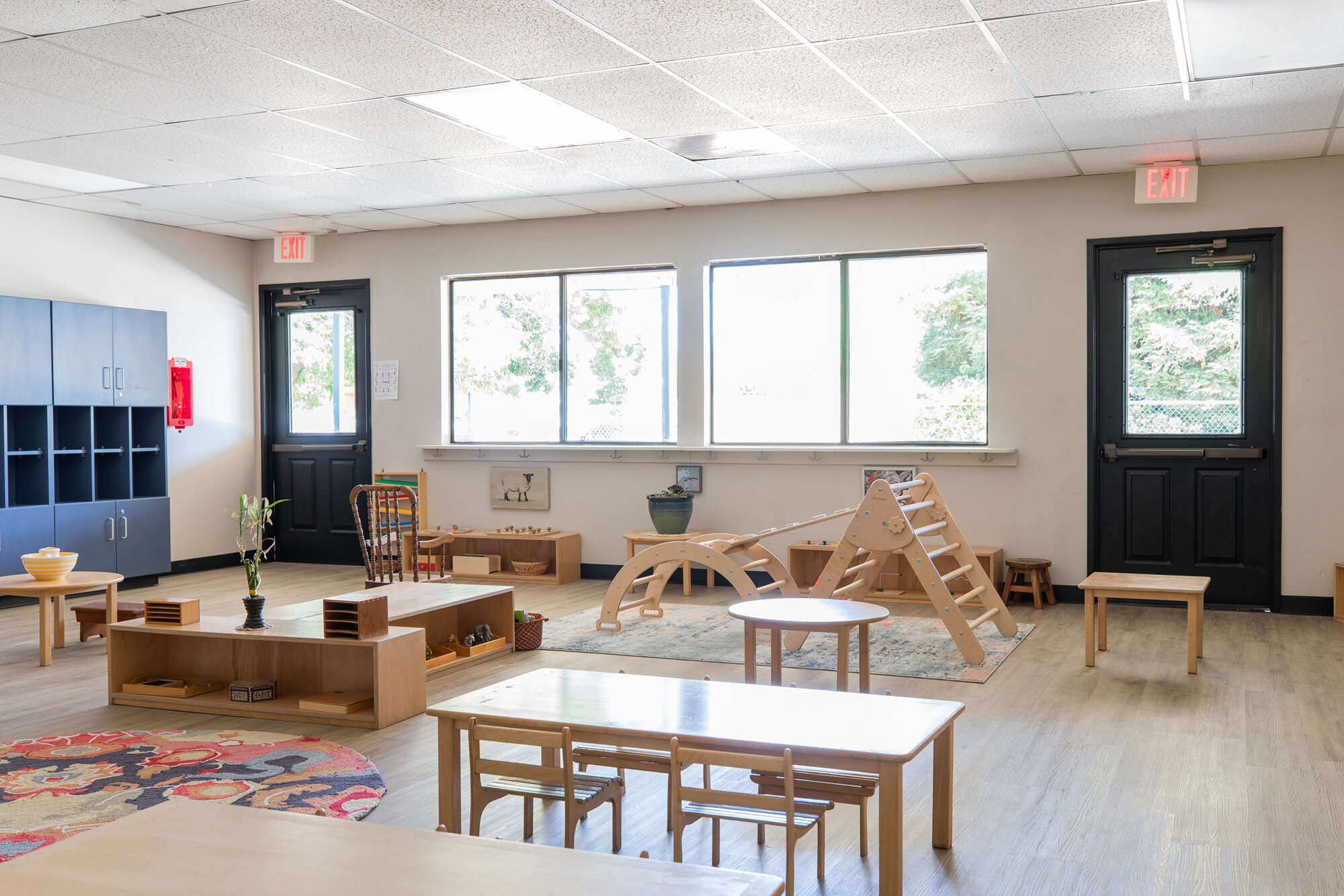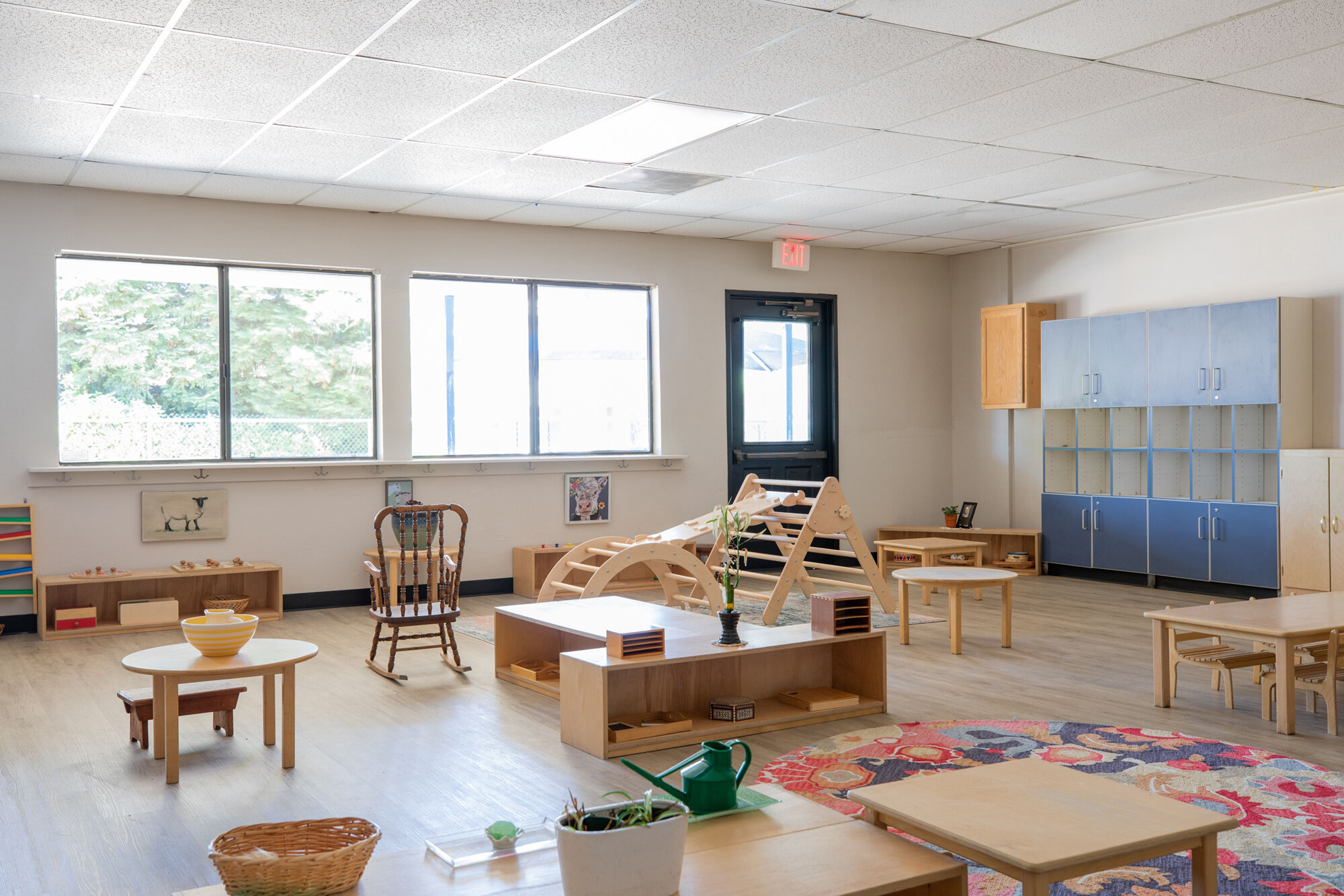Toddler | Rocklin Ranch Montessori
Rocklin, ca
Now Enrolling
4149 rocklin rd, rocklin
(916) 715-0255
ROCKLINRANCHMONTESSORi@gmail.com
CLASSROOM OPTIONS
Option 1 | Full-Day 7:00 a.m. - 6:00 p.m and
Option 2 | Half-Day 7:00 a.m. – 12:00 p.m.
Montessori for Toddlers = Optimal Early Learning
Dr. Montessori discovered that during the toddler time, a young child has a special aptitude for learning certain things:
He is especially sensitive to order – and we build on that interest to establish good habits that last a lifetime.
He is able to absorb language from his environment – learning even big words easily and with pleasure – and becomes happier as he learns the words to express his needs, rather than needing to resort to crying or tantrums.
He is eager to learn to take care of himself, to become independent – and we guide him to learn how to do things by himself, thereby developing his budding sense of self-efficacy.
Enrolling your child in a Montessori toddler program, rather than at a childcare center, has many benefits. Here are just a few for you to consider:
A positive toilet learning experience. Done the Montessori way, almost all children can be diaper free soon after starting in our program. Sign up for our newsletter on the form at the right to discover how we work together to facilitate this developmental milestone!
Fewer toddler struggles. Montessori toddlers learn how to actually do things by themselves, making family meals more fun, and getting out of the house easier.
A child who learns to play happily by himself. Montessori toddlers learn to play independently. You may be surprised how your 2-year-old can occupy himself happily, without your constant attention, no TV baby-sitting needed!
A huge spurt in language capability. Many parents report that their children’s vocabulary increased dramatically within a few months of joining our program. Better language skills = more fun interactions with your child, and fewer tantrums caused by not being understood!
Montessori for toddlers offers more than just childcare:
Trained Montessori teachers, many with bachelor’s degrees andAMI Montessori training who are committed to do their best work in our classrooms (not a revolving-door childcare staff).
A 1:6 , all the way to age 3 (most childcare centers switch to 1:12 at age 2).
Beautiful, welcoming facilities, professionally cleaned every day, and large, well-kept outside spaces.
Quality Montessori learning materials, not just plastic toys often found at childcare centers
A focus on helping your child develop independence skills: we are educators, not just childcare providers.
Toilet learning included at no extra charge.
Flexible schedules (half days and full days) and extended childcare available (7 am – 6 pm).
What we teach
The Montessori toddler classrooms are simpler and slower paced than the Montessori preschool rooms for three to six year olds. Tables and chairs are smaller and the teacher-child ratio is lower (1:6.) The atmosphere is positive, supportive and non-competitive – and includes a lot of singing and physical movement. The toddler Montessori materials are specifically structured to meet the developmental needs of toddlers and to support their need for purposeful activity. The Montessori toddler classroom focuses on two main areas, language development and acquiring skills for independence and social interactions, supplemented by select, simplified Sensorial materials.
Language Development
Toddler age children have a special sensitivity for learning language they hear spoken around them. The toddler classroom offers many creative and intriguing linguistic concepts to expand their growing vocabularies. By participating in conversations, listening to stories, classifying objects and learning songs and poems, they nurture their budding language skills.
Older toddlers even get introduced to phonetic awareness through games that ask them to isolate and repeat beginning sounds of words—an advanced skill often taught in kindergarten in other settings!
Skills for Independence
A toddler spends a large amount of time learning the self-help skills that lead to independence from constant adult help. In our classrooms, we facilitate this development in several ways.
Special “practical life” exercises break down daily tasks into manageable steps, and enable repeated practice to achieve mastery. Toddlers often are in a frustrating position: they want to do things for themselves, but do not know how. Many tantrums can be avoided by enabling a child to do things for himself at a time when he is eager to do so.
Thus, we offer our toddlers endless opportunities to practice daily tasks – from washing a table to watering plants; from dressing themselves in simple clothes (including showing them how to put on a jacket using a trick we call the “Montessori throw,” where the child positions the jacket in front of him where he can see it, puts his hands into the sleeves, then flips the jacket over his head) to mastering buttons, bows and zippers. By performing one step at a time, a child is easily able to master new skills, giving her a great sense of personal achievement and pride.
The crown jewel of the independence curriculum is our elaborate snack routine. Parents regularly comment how they are amazed that 2 ½ year olds can independently serve, jointly eat, and clean up after their daily snack.
A Simple, Orderly Environment, with a Clear, Consistent Structure and Limited Choices
Dr. Montessori realized that much of the toddler’s uncontrollable emotions (tantrums included) come from being out of control – and especially from being in an environment not suited to his needs. Thus, our classrooms are child-sized – and, equally importantly, orderly. A child knows, every day, what to expect when – and where to find his favorite activity. We also offer him limited choices, so he can choose without being overwhelmed.
Social Skills Development Through Role Modeling and Language Development
We gently guide your child to develop the bedrock skills he needs to live together peacefully with other children and adults. We guide him to hang up his own jacket or apron, and put back a work in its proper place in the shelf. We encourage him to problem-solve rather than say “I can’t.” Because children this age have a strong tendency to imitate what they see, our teachers constantly model appropriate social skills, good manners and consideration for others. Our skilled teachers also show your child how to use words to identify the feelings they experience in themselves and that they see in others. In these ways we are able to help smooth their initial social interactions.
Psychosensorial Activities
Our toddler program also contains a selection of psychosensorial exercises – such as bead stringing, sewing, puzzles, stacking and balancing – which help the children in developing eye-hand coordination and dexterity.
Our teachers lead the children in song, dance and a variety of other exercises that offer them the opportunity to jump, climb, balance, crawl or skip. These exercise their large muscles and support the development of balance and equilibrium.
Our Teachers
Trained, Caring Montessori Teachers, Not Just Childcare Providers
Childcare centers often have high staff turnover: low-paid, poorly trained childcare providers rarely view their job as a career. This is not the case with Rocklin Ranch Montessori: we recruit, train and retain highly trained Montessori teachers. Each of our head toddler teachers has either already completed the intensive, AMI Assistant to Infancy training or we train her in-house, as an assistant teacher, and then sponsor her for the full Montessori training while she works for us. At Rocklin Ranch, teaching toddlers is a career, not a passing childcare job.
A well-trained, well-compensated, steady staff is essential at Rocklin Ranch and we do not just want your child to be in a safe, fun childcare setting; we want him to learn and grow by leaps and bounds!








